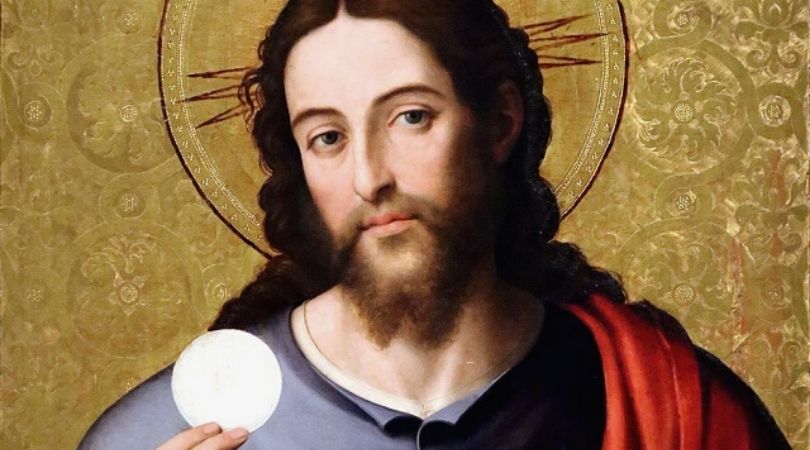Today’s Saint: Saint Norbert, June 6 (c. 1080 – June 6, 1134)
June 6, 2017How Faith Relates to Hope and Charity
June 6, 2017
“Give to God what belongs to God” – Scripture: Mark 12:13-17
13 And they sent to him some of the Pharisees and some of the Herodians, to entrap him in his talk. 14 And they came and said to him, “Teacher, we know that you are true, and care for no man; for you do not regard the position of men, but truly teach the way of God. Is it lawful to pay taxes to Caesar, or not? 15 Should we pay them, or should we not?” But knowing their hypocrisy, he said to them, “Why put me to the test? Bring me a coin, and let me look at it.” 16 And they brought one. And he said to them, “Whose likeness and inscription is this?” They said to him, “Caesar’s.” 17 Jesus said to them, “Render to Caesar the things that are Caesar’s, and to God the things that are God’s.” And they were amazed at him.
Meditation: What do we owe God and what’s our obligation towards others? Paul the Apostle tells us that we must give each what is their due (Romans 13:6-8). The Jewish authorities sought to trap Jesus in a religious-state dispute over the issue of taxes. The Jews resented their foreign rulers and despised paying taxes to Caesar. They posed a dilemma to test Jesus to see if he would make a statement they could use against him. If Jesus answered that it was lawful to pay taxes to a pagan ruler, then he would lose credibility with the Jewish populace who would regard him as a coward and a friend of Caesar. If he said it was not lawful, then the Pharisees would have grounds to report him to the Roman authorities as a political trouble-maker and have him arrested.
Jesus avoided their trap by confronting them with the image of a coin. Coinage in the ancient world had significant political power. Rulers issued coins with their own image and inscription on them. In a certain sense the coin was regarded as the personal property of the ruler. Where the coin was valid the ruler held political sway over the people. Since the Jews used the Roman currency, Jesus explained that what belonged to Caesar must be given to Caesar.
We belong to God and not to ourselves
This story has another deeper meaning as well. We, too, have been stamped with God’s image since we are created in his own likeness (Genesis 1:26-27). We rightfully belong, not to ourselves, but to God who created us and redeemed us in the precious blood of his Son, our Lord Jesus Christ (see 1 Corinthians 6:19-20). Paul the Apostle says that we are to present our bodies as a living sacrifice to God (Romans 12:1). Do you acknowledge that your life belongs to God and not to yourself? And do you give to God what rightfully belongs to Him?
“Lord, because you have made me, I owe you the whole of my love; because you have redeemed me, I owe you the whole of myself; because you have promised so much, I owe you all my being. Moreover, I owe you as much more love than myself as you are greater than I, for whom you gave yourself and to whom you promised yourself. I pray you, Lord, make me taste by love what I taste by knowledge; let me know by love what I know by understanding. I owe you more than my whole self, but I have no more, and by myself I cannot render the whole of it to you. Draw me to you, Lord, in the fullness of love. I am wholly yours by creation; make me all yours, too, in love.” (prayer of Anselm, 1033-1109)
Psalm 90:1-4,14-16
1 Lord, you have been our dwelling in all generations.
2 Before the mountains were brought forth, or ever you had formed the earth and the world, from everlasting to everlasting you are God.
3 You turn man back to the dust, and say, “Turn back, O children of men!”
4 For a thousand years in your sight are but as yesterday when it is past, or as a watch in the night.
14 Satisfy us in the morning with your steadfast love, that we may rejoice and be glad all our days.
15 Make us glad as many days as you have afflicted us, and as many years as we have seen evil.
16 Let your work be manifest to your servants, and your glorious power to their children.
Daily Quote from the early church fathers: Put off the earthly image and put on the heavenly one, by Origen of Alexandria (185-254 AD)
“Some people think that the Savior spoke on a single level when he said, ‘Give to Caesar what belongs to Caesar’ – that is, ‘pay the tax that you owe.’ Who among us disagrees about paying taxes to Caesar? The passage therefore has a mystical and secret meaning. There are two images in humanity. One he received from God when he was made, in the beginning, as Scripture says in the book of Genesis, ‘according to the image and likeness of God’ (Genesis 1:27). The other image is of the earth (1 Corinthians 15:49). Man received this second image later. He was expelled from Paradise because of disobedience and sin after the ‘prince of this world’ (John 12:31) had tempted him with his enticements. Just as the coin, or denarius, has an image of the emperor of this world, so he who does the works of ‘the ruler of the darkness’ (Ephesians 6:12) bears the image of him whose works he does. Jesus commanded that that image should be handed over and thrown away from our face. He wills us to take on that image, according to which we were made from the beginning, according to God’s likeness. It then happens that we give ‘to Caesar what belongs to Caesar, and to God what is God’s.’ Jesus said, ‘Show me a coin.’ For ‘coin,’ Matthew wrote ‘denarius’ ( Matthew 22:19). When Jesus had taken it, he said, ‘Whose inscription does it have?’ They answered and said, ‘Caesar’s.’ And he said to them in turn, ‘Give to Caesar what is Caesar’s, and to God what is God’s.'” (excerpt from HOMILY ON THE GOSPEL OF LUKE 39.4-6)
Meditations may be freely reprinted for non-commercial use – please cite: copyright (c) 2017 Servants of the Word, source: www.dailyscripture.net, author Don Schwager
Scripture quotations from Common Bible: Revised Standard Version of the Bible, copyright 1973, and Ignatius Edition of the Revised Standard Version of the Bible, copyright 2006, by the Division of Christian Education of the National Council of the Churches of Christ in the United States of America. Used by permission. All rights reserved. Citation references for quotes from the writings of the early church fathers can be found here.







